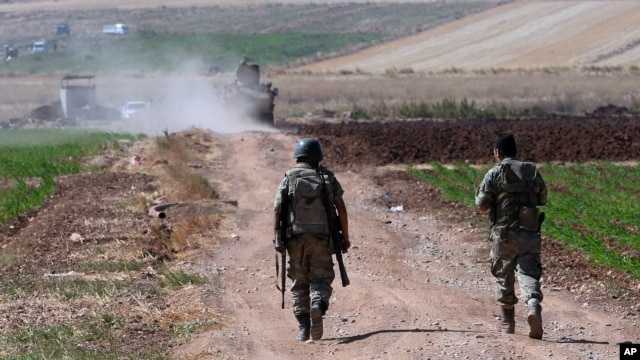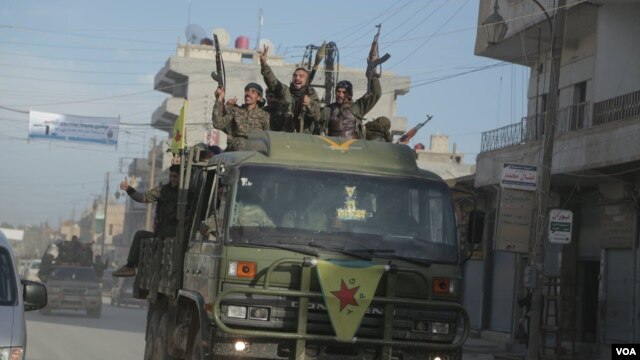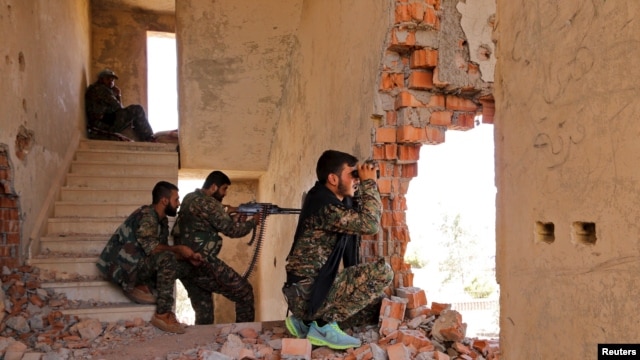Tensions Rise With Turkey as Syrian Kurds Advance
News / Middle East
Tensions Rise With Turkey as Syrian Kurds Advance
FILE - Turkish soldiers patrol near the border with Syria, ouside the village of Elbeyli, east of the town of Kilis, southeastern Turkey, July 24, 2015.
December 29, 2015 4:30 PM
Tensions are mounting once gain between Turkey and Syrian Kurds, complicating Western efforts to develop a local ground force in Syria able to counter Islamic State (IS) militants, and roiling relations between Washington and its NATO ally.
A U.S.-backed alliance of Syrian Kurdish fighters and Arab rebel groups is being warned by Turkish authorities to pull back east of the Euphrates after crossing the river following the ouster of IS fighters from a strategic dam over the weekend.
The Syrian Democratic Forces (SDF) - a coalition dominated by the Kurdish People's Protection Units (YPG), the armed wing of the Democratic Union Party (PYD) - crossed the river after seizing the Tishreen Dam from IS. The militants had held the dam for two years.
U.S. officials welcomed the offensive, which severs an important IS supply route between the northern Aleppo countryside near the border with Turkey and the militants’ self-styled capital of Raqqa.
On Twitter, Brett McGurk, U.S. President Barack Obama’s special envoy for the anti-IS coalition, said the assault on the dam was part of a broader offensive against the self-proclaimed Islamic State caliphate, comparing it in importance to Iraqi forces seizing the city of Ramadi.
Provoking Ankara
The SDF offensive, however, has provoked the ire of Turkish authorities, who fear the YPG will use the victory to press north to the mainly Kurdish town of Jarablus as part of a bid to link three Kurdish-controlled cantons along the 900-kilometer border with Turkey.
Speaking at a news conference in Belgrade Monday, Turkish Prime Minister Ahmet Davutoglu warned that Turkey would not look positively on Syrian Kurdish forces hostile to Ankara moving further west.
“Turkey is closely following the situation in northern Syria's Tishreen area, and will not let any hostile groups cross west of Euphrates," Davutoglu said.
He added that so far, the information he had received indicated that the SDF fighters who have been crossing the river were Arabs, not Kurds.
SDF leaders appear not to agree with the distinction.
FILE - Members of the Kurdish People's Protection Units (YPG) return to Qamishli after a battle near Hasaka, March 14, 2015. (Z. Omar/VOA)
The Kurdish SDF spokesman, Sarhad Abbas, told local media, “after liberating Tishreen Dam, our forces were able to regain the towns of Tishreen and Sakaniya on the western bank of the Euphrates River.”
He also said, “the operations of our joint forces will continue until eliminating the terror group.”
A Turkish official, who asked not to be named, said the prime minister was raising the issue of the Euphrates crossing with Washington, which has been backing the SDF offensive with airstrikes on IS positions in nearby towns.
“We want wiser heads to prevail and are giving the YPG time to withdraw,” he said.
U.S.-led coalition airstrikes have increased in tempo in recent days on IS in the towns of Manbij and Mar’a in the northern Aleppo countryside - part of an effort to press the militants to the west of where the SDF is fighting.
On Tuesday, coalition warplanes struck Manbij five times, targeting roads and vehicles, according to the Pentagon.
Erdogan alarmed
The Kurdish YPG is the largest armed group in the SDF, which was formed with U.S. encouragement in October. The coalition includes about 5,000 Assyrians, Arabs and Turkmen but approximately 20,000 Kurdish fighters, according to group leaders VOA has interviewed.
In June, when Syrian Kurdish forces supported by some Arab rebel militias captured the IS-held border town of Tal Abyad, Ankara warned the United States and Western powers of red lines when it comes to the Kurds and their military advances in northern Syria. The warnings included a firm position that the Kurds must not threaten the territorial integrity of Syria by seeking their own autonomous Kurdish state.
Since then, the Kurdish YPG fighters' military gains have increasingly alarmed Turkish President Recep Tayyip Erdogan. He approved a national security document after the capture of Tal Abyad, stating that one of the key aims of Turkish policy is to ensure there should be no demographic changes or population shifts on the Syrian side of the border as a result of Kurdish military offensives against IS.
FILE - Kurdish People's Protection Units (YPG) fighters take up positions inside a damaged building in al-Vilat al-Homor neighborhood in Hasaka city, Syria, as they monitor local movements of Islamic State fighters.
Turkish officials say they fear the United States is giving a green light, if only inadvertently, to the Kurds’ post-war ambitions in Syria and that Kurdish autonomy in Syria will fan Kurdish separatist ambitions in Turkey. The PYD is an offshoot of Turkey’s outlawed Kurdistan Workers’ Party, the PKK.
In October, Davutoglu disclosed that Turkey had struck YPG fighters in Syria twice after they defied Ankara's warning not to cross the Euphrates.
Rudaw, a private Kurdish media company with ties to Iraqi Kurdistan, warned in an editorial Tuesday that the crossing of the Euphrates by the SDF renews the danger of a Turkish military intervention in northern Syria. That, the editorial said, would increase the “likelihood of further escalating tensions with the Russians and risking another lethally dangerous clash” with Moscow, which has been courting the Syrian Kurds in recent weeks.




Comments